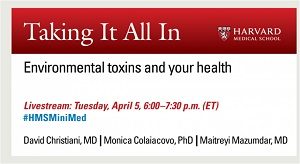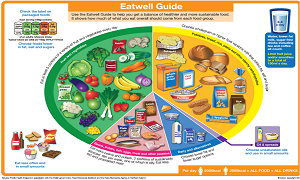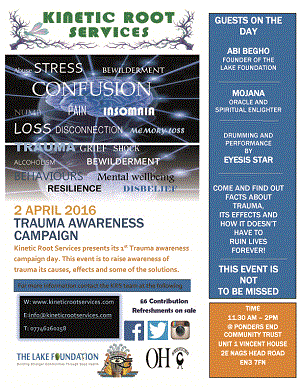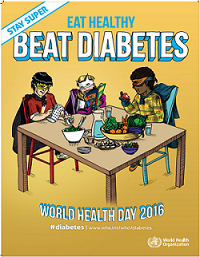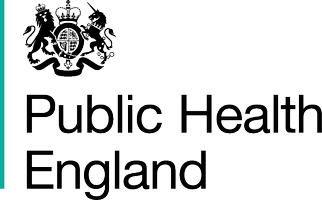A couple of weeks ago we listened live to Harvard Medical School’s Mini Med seminar,’ Taking it all In: Environmental Toxins’. This was a really interesting event featuring experts in the field David Christiani, Professor of Medicine; Monica Colaiacovo, Professor of Genetics; and Maitreyi Mazumdar, Assistant Professor of Neurology. Together they discussed how environmental toxins affect our risk of cancer, women’s reproductive health and child development.
From Professor Christianai we learnt about the history of establishing the link between cancer and environmental toxins. This work started in 1775 when a link between scrotum cancer and children who worked as chimney sweeps was identified and going forward this led to links between tobacco, lifestyle and various chemicals being determined.
He explained that 6% of cancers are linked to environmental factors and these factors include: industrial exposures, like asbestos and polycyclic aromatic hydrocarbons (PAH); lifestyle factors, like tobacco and diet; naturally occurring factors such as exposure to UV light and radon and finally medical treatments like chemotherapy.
It was shocking to hear that of the 80,000 chemicals on the market only 200 have been tested to determine whether they are carcinogenic and he called for more work to be done in this area. He suggested that the contribution that the environment plays in increasing our risk of cancer has been underestimated and much more work is needed to gain clarity in this area.
Next we heard from Professor Colaiacovo who spoke about the effect of environmental toxins on reproductive health. She stated that scientists are only now starting to understand the health effects of the various chemicals in the environments. Like Professor Christianai she stated that of the 80,000 chemicals present in the environment only a small numbers have been tested on reproductive health and the work that she is doing aims to address this. Currently her team is working on understanding how BPA, a product we’re exposed to everyday, affects reproductive health. She summarised previous work in this area stating that a Japanese study has shown that BPA is associated with miscarriages. Professor Colaiacovo has been exploring the effects of BPA in worms and her research suggests that BPA has a significant effect on a meiosis which is very important biological process in reproduction. They now want to look at other chemicals such as crude oil, pesticides and phthalates. They are hoping to explore reproductive health and also trans-generational effects.
Finally we heard from Professor Mazumdar who delivered a presentation on children and environmental toxins. She started by explaining that we may not realise it but children are affected differently when it comes to environmental toxins because they have different and unique exposures; they are growing, they live longer so are exposed for longer and they rely on adults to protect them, they don’t make choices about what they are exposed to.

When we look at the unique and different exposures to chemicals Professor Mazumdar explained that children are exposed through the placenta; breastfeeding; because they are closer to the ground and therefore breathe slightly different air and are closer to some toxins; and have more “off-the-ground-into-the mouth” experiences. Additionally children, because of their size, breathe in more air and they tend to eat more food. Finally children’s brains are growing rapidly and this is a very complex process so there are many opportunities for things to go wrong. Due to all these reasons children are more susceptible to environmental toxins and have heightened vulnerability therefore we should be more cautious about introducing new chemicals into the environment.
This was a very informative event and we have to admit we were very surprised that there is still so much that is unknown about the effects of these chemicals on our health. The mainstream seems to be falsely reassuring us that there is clarity on these substances and to hear experts say that actually we do need to proceed with caution, for example, when microwaving food in plastic containers really made us sit up and take notice.
The next Harvard Mini Med Lecture will be ‘The New Old Age: How the body ages and how to keep it young’ on Tuesday 19th April from 6pm -7:30pm (US Eastern Time)










